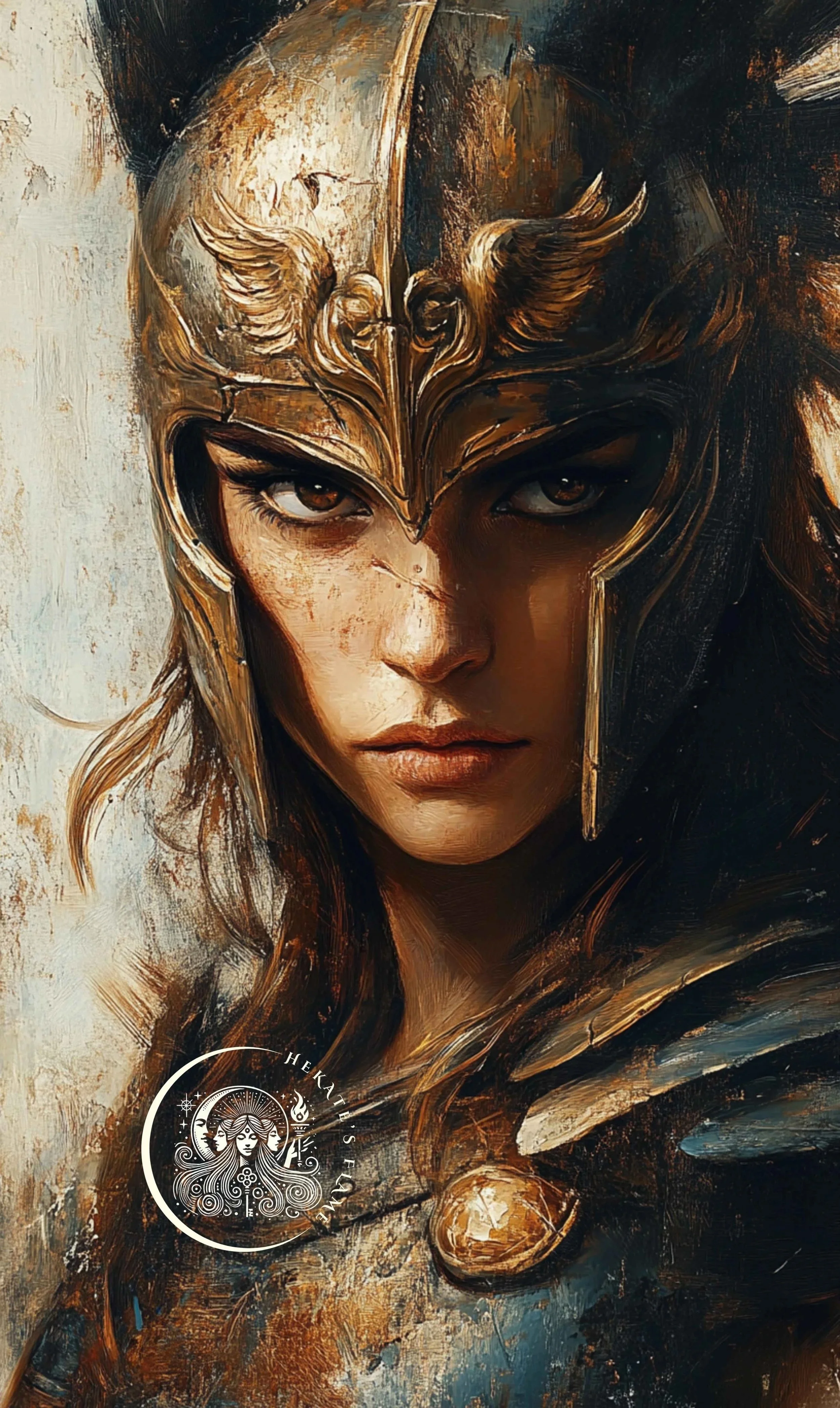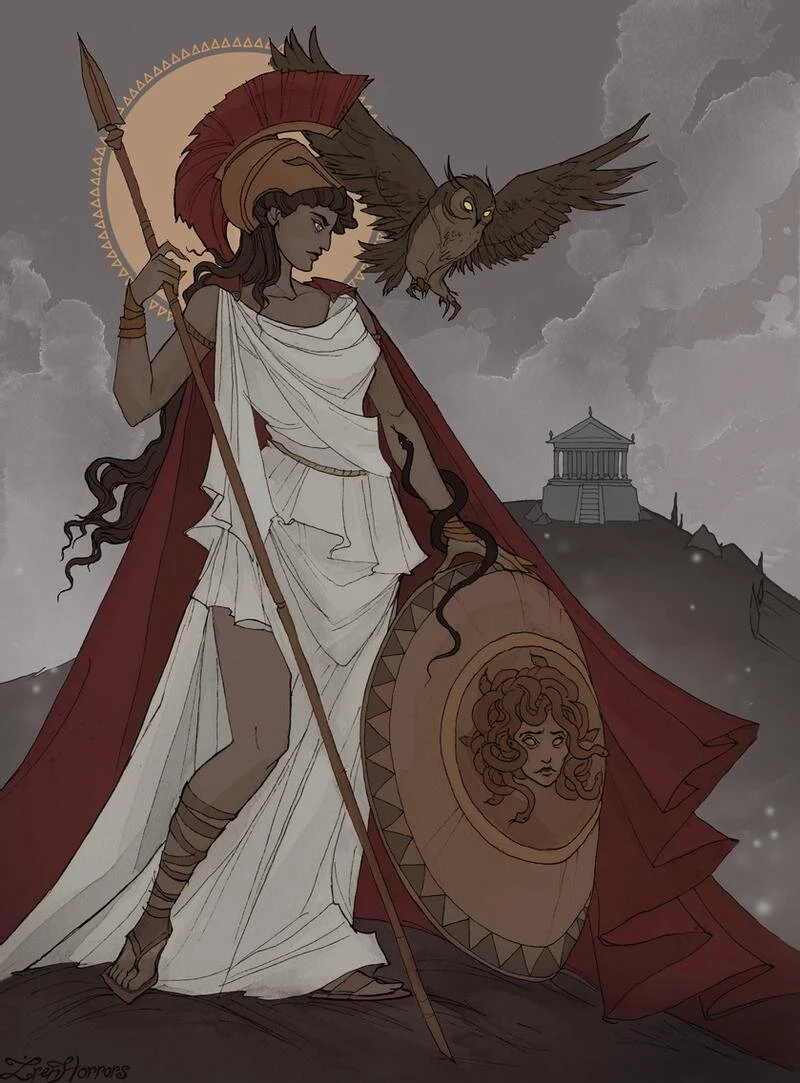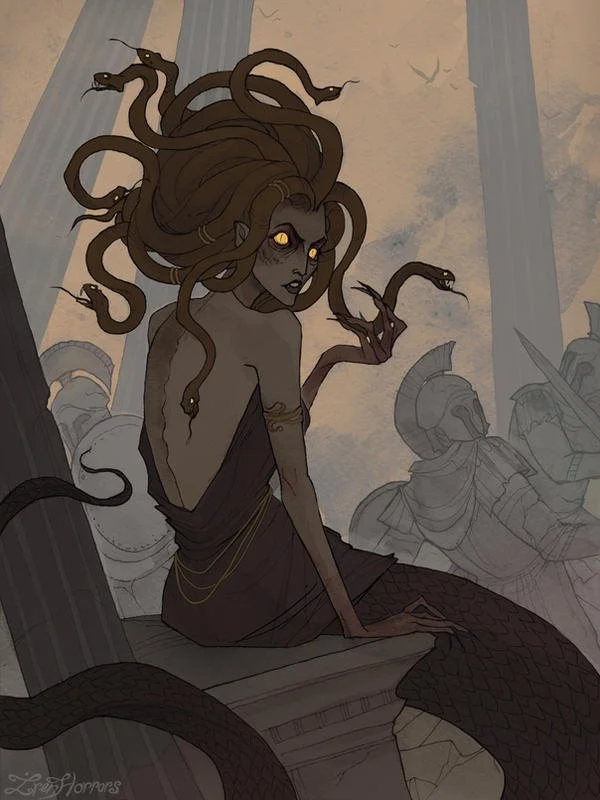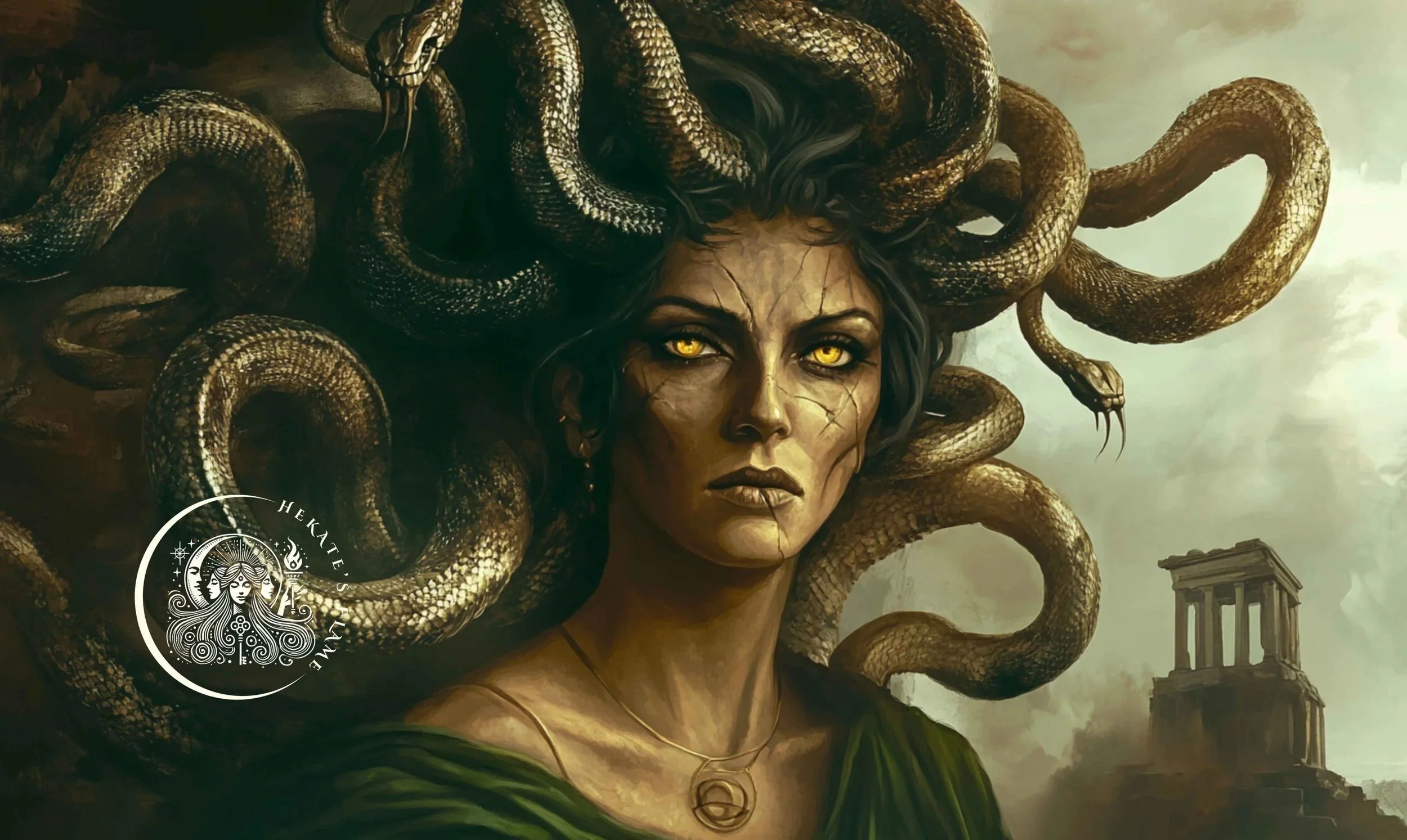Athena as Archetype: the Symbolism of Medusa's Gaze in Patriarchal Storytelling
From Myth to Flame: Handmade Candles for Athena and Medusa
Alongside my work as a psychotherapist, I am also the keeper of Hekate’s Flame Apothecary, where I bring myth into form through candle making.
Born of Greek and Anatolian roots, my lifelong reverence for story and ritual has guided me to craft candles as offerings, each one a vessel of archetype and alchemy, hand-poured with care.
‘Wisdom’s Bloom’ opens with bergamot and green leaves, blossoms with honeysuckle, jasmine, and rose at its heart, and settles into a base of sandalwood and guaiacwood. It is an offering to Athena’s wisdom, strategy, and clear sight, a flame for discernment and the courage to see truly.
‘Serpent’s Gaze’ begins with incense and spearmint, deepens into smoke at its heart, and rests on a base of oud, frankincense, myrrh, amber, musk, and leather. It is an offering to Medusa’s resilience and shadowed strength, carrying the serpentine power of survival and the fierce beauty that rises from darkness.
You are welcome to explore each of these candles, alongside more in-depth tellings of Athena’s and Medusa’s myths and stories, on their pages at Hekate’s Flame.
Athena Unveiled: Exploring the Complexities of Her Mythical Legacy
(Artwork by IrenHorrors on DeviantArt)
My love for Athena is heartfelt and bittersweet, not because of any inherent flaw in her divine nature but rather due to the unjust ways male playwrights have maligned her image despite extolling her power and wisdom. Their depictions of Athena perpetuated harmful stereotypes about women and reinforced patriarchal values that ultimately tainted the essence of this revered goddess.
While other forgotten goddesses, such as Hekate, Cybele, Inanna, Tiamat, and Astarte, have retained their stories despite being cast aside, forgotten, and erased, Athena was thrust into the limelight as a favored child of the new patriarchal order. Born fully formed from the head of her father Zeus, she was celebrated as one of the most influential and wise goddesses in ancient Greece, feared for her strategic prowess and her wrath, often directed towards her own gender.
Yet, despite her power and status, Athena could not escape the reality of her internalized misogyny, a symptom of the very patriarchal society that elevated her to such great heights as a symbol of strength, wisdom, strategy, and helper of heroes. The scars of her mistreatment are impossible to ignore, even amidst the blessings of her visibility and fame.
(Artwork by IrenHorrors on DeviantArt)
Behold the famous myths of Athena & Medusa, Athena & Arachne, Athena & Ismene, Athena & Iodama, and Athena & Auge. These tales share a common thread - in most of them, Athena's wrath is unleashed upon female characters while sparing their male counterparts and even her own godly vanity.
What is the common denominator of these stories? They were penned by male playwrights, bards, authors, poets, and historians of that time. These same writers also devoured Athena's mother, the Titaness Metis, goddess of forethought and Zeus's first wife. Metis was prophesied to bear a child more powerful than Zeus, so he swallowed her whole while she was pregnant with Athena. Thus, Metis was literally consumed by the patriarchal Olympian rule.
The Goddess and the Patriarchy: Athena's Story as a Tool of Misogyny in Ancient Athens
During the era of ancient Athens, male playwrights played a significant role in shaping and influencing public opinion. Athenian society was patriarchal, where men held power and women were largely marginalized. Male playwrights were not only responsible for providing entertainment to the masses but also for promoting the city-state's political and social agenda. They were often commissioned by wealthy patrons with a vested interest in maintaining the status quo and reinforcing the values and beliefs of the ruling class. They are pretty much what you would call lobbyists nowadays.
In this context, the portrayal of Athena as a powerful but vengeful goddess who targeted other women instead of men may have been a deliberate attempt to reinforce patriarchal beliefs about women's inferiority and portray them with a propensity for jealousy and pettiness. By doing so, male Athenian playwrights reinforced the existing power structures and maintained the status quo, ensuring that their society remained firmly in the hands of the ruling class.
Breaking the Patriarchal Narrative: The Evolution of Athena's Archetype
(Artwork by Yliade on DeviantArt)
A part of me believes that applying modern standards to ancient myths is problematic and not fully authentic as a literary practice. However, another part of me believes it is imperative to acknowledge the damaging influence of patriarchal societies that pit women against each other and blame the female victim/survivor in the narrative, particularly in stories where they have suffered at the hands of men. This is an enduring tale that has unfortunately persisted throughout history.
Regarding Athena's story, I find comfort in the perspective of Dr. Christine Downing. She argues that reducing Athena to a mere tool of the patriarchy is unfair and diminishes her true potential. Instead, we should reclaim her and not abandon her. I refuse to see Athena as a goddess who harbors hatred toward women. She was assigned this role, a product of her time and the societal norms that dictated her behavior.
In fact, Athena's story, particularly her interactions with Medusa and other women she wronged, reveals the complex and multifaceted nature of female survival in a society that seeks to marginalize women's power. They are two sides of the same coin, fighting for survival, adaptation, endurance, and the reclamation of their true power in a world that undermines their potential.
Beyond the confines of feminist academia, it is imperative that we bring Athena back into our collective consciousness, revitalized and rejuvenated as the formidable archetypal energy she truly is - a warrior for justice and equality rather than a mere symbol of patriarchal subjugation.
Medusa: from Gorgon to Guardian - embracing the Protector Parts in Trauma Survivors
(Art by Abigail Larson on DeviantArt)
Not long ago, I took part in a training on trauma, where the myth of Medusa was used to depict the "monster within" that lingers within numerous trauma survivors.
However, contrary to popular belief, Medusa was not born a Gorgon with a head full of snakes capable of petrifying people with her gaze. She was a human, a high priestess of Athena, who was sexually assaulted by Poseidon in the goddess's temple.
In a display of internalized misogyny, Athena, blaming Medusa for defiling her temple, transformed her into a Gorgon, as male playwrights of the time chronicled. Poseidon, the perpetrator, faced no consequences in the myth.
While many survivors of sexual assault may feel like an inner monster resides within them, personifying it as Medusa, who embodies resilience, strength, and protection from a nuanced trauma perspective, perpetuates the "blame the victim" mentality but also vilifies the parts within us that are hurting and wounded, thus preventing the opportunity for profound healing.
As an IFS therapist who works specifically with complex trauma, I value the importance of holding up a shield when approaching trauma. Indeed, navigating trauma requires intentionality and respecting the pace of trust to not re-traumatize. Therefore, we work collaboratively with our client's internal systems, allowing them to lead the way at their own pace and only lower the shield when they feel ready enough to approach Medusa-like parts.
Moreover, within ourselves, there are no monsters or enemies; instead, we have different parts, some of which are wounded and hurting, while others fiercely protect these vulnerable parts from experiencing further pain and distress. As for Medusa, she is a testament to the potential for rebirth, self-preservation, and, most importantly, healing from the brutality of sexual trauma.
Athena's Symbolism: From Medusa's Gaze to the Owl of Wisdom: Decoding Athena's Symbols
(Art by Sieskja on DeviantArt)
Athena, the tactician-warrior goddess, is often depicted wearing full armor, a helmet, and a spear, ready for battle. Her breastplate or shield, known as her aegis, bears Medusa's visage. Additionally, Athena is commonly accompanied by an owl, a symbol of wisdom recognized throughout cultures.
However, it is plausible that Athena's origins predate her elevation by Athenian historians and playwrights. Some speculate that she may have been the Minoan warrior-goddess of fertility and renewal, Potnia Atana, who wielded serpents as symbols. In addition, Athena's cult in Athens is steeped in chthonic and primordial imagery of snakes and labyrinths, with links to the Minoan civilization, further suggesting the possibility of her earlier iteration as a goddess of wisdom, arts, and crafts.
Inviting Athena and Medusa Within
As we ponder Athena as the embodiment of wisdom and strategy and Medusa as the representation of protection, adaptability, and survival, they also serve as a mirror, reflecting our innermost strengths and most profound biases.
Have you recognized these aspects - a wise, protective, or adaptable part - within yourself?
Or a part of you that may harbor prejudice toward women?
How do you strategize to meet your needs?
How can you honor or reclaim these parts of yourself?
And as we continue to reflect on Athena and Medusa, we can consider how they have shown up in our lives.
What might Athena/Medusa mean to you personally?
Has she or any of her symbols graced your dreams?
If so, what message might she be trying to impart?
Reflect on Athena's and Medusa's qualities, and consider how they relate to your life. These words may offer a window into the deeper meaning of their presence.
Warmly,
Anny
🦉🐍
References
Cavendish, R. (1983). Man, myth and magic: the illustrated encyclopedia of mythology, religion and the unknown. Marshall Cavendish.
Downing, C. (1981). The goddess: Mythological images of the feminine. Crossroad.
Martin, K., & Ronnberg, A. (2010). The book of symbols: Reflections on archetypal images. Taschen.
Nozedar, A. (2010). The illustrated signs & symbols sourcebook: An A to Z compendium of over 1000 designs. Harper.
Spretnak, C. (1992). Lost goddesses of early Greece: A collection of pre-Hellenic myths. Beacon Press.







